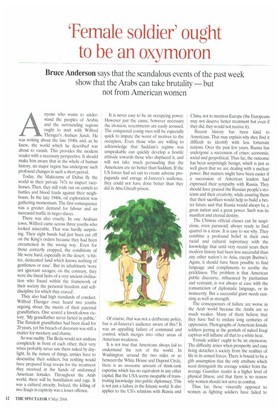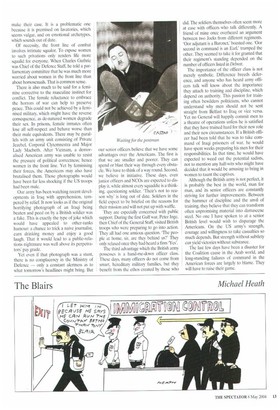'Female soldier' ought to be an oxymoron
Bruce Anderson says that the scandalous events of the past week show that the Arabs can take brutality — but not from American women
Anyone who wants to understand the peoples of Arabia and the surrounding regions ought to start with Wilfred Thesiger's Arabian Sands. He was writing about the late 1940s and, as he knew, the world which he described was about to vanish. This provides the modern reader with a necessary perspective. It should make him aware that in the whole of human history, no major region has undergone such profound changes in such a short period.
Today, the Maktoums of Dubai fly the world in their private 747s to inspect racehorses. Then, they still rode out on camels to battles and blood feuds against their neighbours. In the late 1940s, oil exploration was gathering momentum. The first consequence was a greater demand for labour and an increased traffic in negro slaves.
There was also cruelty. In one Arabian town, Wilfred came across three youths who looked miserable. That was hardly surprising. Their right hands had just been cut off on the King's orders because they had been circumcised in the wrong way. Even for those correctly cropped, the conditions of life were hard, especially in the desert, 'a bitter, desiccated land which knows nothing of gentleness or ease'. But its inhabitants 'were not ignorant savages; on the contrary, they were the lineal heirs of a very ancient civilisation who found within the framework of their society the personal freedom and selfdiscipline for which they craved'.
They also had high standards of conduct. Wilfred Thesiger once heard two youths arguing about the merits of their paternal grandfathers. One scored a knock-down victory. 'My grandfather never farted in public.' The flatulent grandfather had been dead for 20 years, yet his breach of decorum was still a matter for mockery and shame.
So was nudity. The Bedu would not undress completely in front of each other; their very wives probably never saw them naked by daylight. In the nature of things, armies have to desensitise their soldiers, but nothing would have prepared Iraqi troops for the treatment they received at the hands of uniformed American females. Throughout the Arab world, there will be humiliation and rage. It was a cultural atrocity. Indeed, the killing of two Iraqis in captivity was a lesser offence. It is never easy to be an occupying power. However just the cause, however necessary the invasion, resentments are easily aroused. The conquered young men will be especially quick to impute the worst of motives to the occupiers. Even those who are willing to acknowledge that Saddam's regime was unspeakable can quickly develop a hostile attitude towards those who displaced it, and will not take much persuading that the Americans are no better than Saddam. If the US forces had set out to create adverse propaganda and enrage al-Jazeera's audience, they could not have done better than they did in Abu Ghraib prison.
Of course, that was not a deliberate policy, but is al-Jazeera's audience aware of this? It was an appalling failure of command and control, which merges into other areas of American weakness.
It is not true that Americans always fail to understand the rest of the world. In Washington, around the two miles or so between the White House and Dupont Circle, there is an awesome amount of think-tank expertise which has no equivalent in any other capital. But the USA seems incapable of transmuting knowledge into public diplomacy. This is not just a failure in the Islamic world. It also applies to the US's relations with Russia and China, not to mention Europe (the Europeans may not deserve better treatment but even if they did, they would not receive it).
Recent history has been kind to Americans. That may explain why they find it difficult to identify with less fortunate nations. Over the past few years, Russia has undergone a succession of crises: economic, social and geopolitical. Thus far, the outcome has been surprisingly benign, which is just as well given that we are dealing with a nuclear power. But matters might have been easier if a succession of American leaders had expressed their sympathy with Russia. They should have praised the Russian people's stoicism and their creativity, while assuring them that their sacrifices would help to build a better future and that Russia would always be a great nation and a great power. Such was its manifest and eternal destiny.
The Chinese official classes can be suspicious, even paranoid; always ready to find quarrel in a straw. It is easy to see why. They combine a profound belief in their own racial and cultural supremacy with the knowledge that until very recent years their modern history had been less successful than any other nation's in Asia, except Burma's. Again, it should have been possible to find language and compliments to soothe the prickliness. The problem is that American public discourse, influenced by puritanism and restraint, is not always at ease with the romanticism of diplomatic language, or its insincerity. But a successful giant needs cunning as well as strength.
The consequences of failure are worse in the Arab world because the Arabs are so much weaker. Many of them believe that they have had to endure long centuries of oppression. Photographs of American female soldiers jeering at the genitals of naked Iraqi captives will inflame all that to a white heat.
'Female soldier' ought to be an oxymoron. The difficulty arises when prosperity and easy living detaches a society from the realities of life in its armed forces. There is bound to be a glib assumption that the only attribute which need distinguish the average soldier from the average Guardian reader is a higher level of physical fitness, and that there is no reason why women should not serve in combat.
Thus far, those viscerally opposed to women as fighting soldiers have failed to make their case. It is a problematic one because it is premised on lavatories, which seems vulgar, and on emotional archetypes, which sounds out of date.
Of necessity, the front line of combat involves intimate squalor. To expose women to such privations only renders life more squalid for everyone. When Charles Guthrie was Chief of the Defence Staff, he told a parliamentary committee that he was much more worried about women in the front line than about homosexuals. That is common sense.
There is also much to be said for a feminine corrective to the masculine instinct for conflict. The female reluctance to embrace the horrors of war can help to preserve peace. This could not be achieved by a feminised military, which might have the reverse consequence, as de-natured women degrade their sex. In prisons, female inmates often lose all self-respect and behave worse than their male equivalents. There may be parallels with an army unit consisting of Private Jezebel, Corporal Clytemnestra and Major Lady Macbeth. After Vietnam, a demoralised American army was unable to resist the pressure of political correctness: hence women in the front line. Yet by feminising their forces, the Americans may also have brutalised them. Those photographs would have been far less shocking if the US troops had been male.
Our army has been watching recent developments in Iraq with apprehension, tempered by relief. It now looks as if the original horrifying photograph of an Iraqi being beaten and peed on by a British soldier was a fake. This is exactly the type of joke which would have appealed to other-ranks humour: a chance to trick a naive journalist, earn drinking money and enjoy a good laugh. That it would lead to a public-relations nightmare was well above its perpetrators' pay grade.
Yet even if that photograph was a stunt, there is no complacency in the Ministry of Defence — only a constant alertness as to what tomorrow's headlines might bring. But our senior officers believe that we have some advantages over the Americans. The first is that we are smaller and poorer. They can spend or blast their way through every obstacle. We have to think of a way round. Second, we believe in initiative. These days, even junior officers and NCOs are expected to display it, while almost every squaddie is a thinking, questioning soldier. 'Their's not to reason why' is long out of date. Soldiers in the field expect to be briefed on the reasons for their mission and will not put up with waffle.
They are especially concerned with public support. During the first Gulf war, Peter Inge, then Chief of the General Staff, visited British troops who were preparing to go into action. They all had one anxious question. 'The people at home, sir, are they behind us?' They only relaxed once they had heard a firm 'Yes'.
The third advantage which the British army possesses is a hand-me-down officer class. These days, many officers do not come from smart, hereditary military families, but they benefit from the ethos created by those who did. The soldiers themselves often seem more at ease with officers who talk differently. A friend of mine once overheard an argument between two Jocks from different regiments. 'Oor adjutant is a Baronet,' boasted one. `Oor second in command is an Earl,' trumped the other. They seemed to take it for granted that their regiment's standing depended on the number of officers listed in Debrett.
The importance of the officer class is not merely symbolic. Difference breeds deference, and anyone who has heard army officers talk will know about the importance they attach to training and discipline, which depend on authority. This passion for training often bewilders politicians, who cannot understand why men should not be sent straight from Belfast to Iraq or vice versa. Yet no General will happily commit men to a theatre of operations unless he is satisfied that they have trained hard for their new role and their new circumstances. If a British officer had been told that he was to take command of Iraqi prisoners of war, he would have spent weeks preparing his men for their responsibilities. In that time, he would have expected to weed out the potential sadists, not to mention any half-wits who might have decided that it would be amusing to bring in women to taunt the captives.
Although the British army is not perfect, it is probably the best in the world, man for man, and its senior officers are constantly striving for further improvements. Between the hammer of discipline and the anvil of training, they believe that they can transform often unpromising material into damascene steel. No one I have spoken to at a senior British level would wish to disparage the Americans. On the US army's strength, courage and willingness to take casualties so much depends. But strength without subtlety can yield victories without substance.
The last few days have been a disaster for the Coalition cause in the Arab world, and long-standing failures of command in the American forces are largely to blame. They will have to raise their game.













































































 Previous page
Previous page